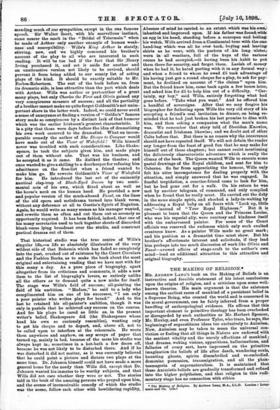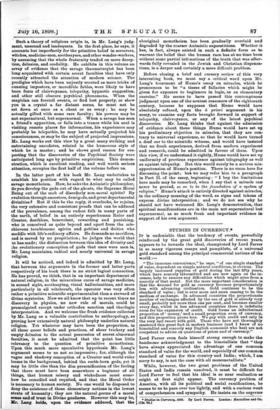THE MAKING OF RELIGION.*
Ma. ANDREW LAN G's 1)00k on the Making of Beliefs is an instructive and forcible statement of his latest conclusions upon the origins of religion, and a criticism upon some well- known theories. His main argument is that the existence among the earliest races of mankind of a persistent belief in a Supreme Being, who created the world and is concerned in its moral government, can be fairly inferred from a proper handling of anthropological evidence. He affirms that this important element in primitive theology has been overlooked or disregarded by such authorities as Mr. Herbert Spencer, Mr. Huxley, and even Professor Tylor, who trace, he says, the beginnings of superstitious ideas too exclusively to Animism. Now, Animism may be taken to mean the universal con- viction or feeling that all things in Nature are endowed with the sentient vitality and the unruly affections of mankind ; that dreams, waking visions, apparitions, hallucinations, and fallacies of every sort, have impressed on the primitive imagination the beliefs of life after death, wandering souls, haunting ghosts, spirits disembodied and re-embodied. demoniac possession, transmigration, and all the phan- tasmagoria of supernaturalism. It is maintained that these Animistic beliefs are gradually transformed and refined into the higher polytheism, and that religion in this rudi- mentary stage has no connection with ethics.
• The Making of Religion. By Andrew Lang, M.A., LL.D. London: Long- mans and Co. [125.]
Such a theory of religious origin is, in Mr. Lang's judg- ment, unsound and inadequate. In the first place, he says, it accounts but imperfectly for the primitive belief in sorcerers, witches, medicine-men, soothsayers, and other wonder-workers, by assuming that the whole fraternity traded on mere decep- tion, delusion, and credulity. He exhibits in this volume an array of evidence that the savage thaumaturgist has been long acquainted with certain secret faculties that have only recently attracted the attention of modern science. The prodigies which have been unjustly scouted as mere tricks of cunning impostors, or incredible fables, were likely to have been feats of clairvoyance, telepathy, hypnotic suggestion, and other still obscure psychical phenomena. When the magician can foretell events, or find lost property, or show you in a crystal a far distant scene, he must not be set down at once as a cheat or as crazy ; he may be actually gifted with some rare faculty; his powers may be not supernatural, but supernormal. When a savage has seen a friend's apparition, or falls into a trance while his soul is visiting remote places for information, his experiences may probably be telepathic, he may have actually projected his consciousness, or may be the subject of projected impressions. Mr. Lang works out this view by a great many striking and entertaining anecdotes, related in the humorous style of which he is master ; and he shows good reason for sus- pecting that the discoveries of the Psychical Society were anticipated long ago by primitive empiricism. This demon- stration, which is excellent reading, and well worth serious attention, occupies the first half of the volume before us.
In the latter part of his book Mr. Lang undertakes to establish his position with regard to what may be called savage monotheism. How, he asks the Animistic philosopher, do you develop the gods out of the ghosts, the Supreme Moral Being out of the mob of disorderly non-moral spirits? By evolution through ancestors, demigods, and great departmental divinities P But if this be the reply, it overlooks, he rejoins, the very extensive and consistent proofs that can be adduced of the prevalence, among the rudest folk in many parts of the earth, of belief in an entirely superhuman Ruler and Creator, deathless, benevolent, rewarding and punishing, who is conceived as quite beyond and apart from the mis- chievous troublesome spirits and goblins and deities who meddle with life's ordinary affairs. He demands no sacrifices, and is moved by no propitiation ; he judges the world that he has made; the distinction between this idea of divinity and he evolutionary conception of gods that once were men is, Mr. Lang maintains, radical and nearly universal in savage religion.
It will be noticed, and indeed is admitted by Mr. Lang, that between the arguments in the former and latter parts respectively of his book there is no strict logical connection. He has proved, we think, that in an important department of natural religion, in the miraculous cures of savage medicine, in second sight, soothsaying, visual hallucinations, and more particularly in all witchcraft, the operator was very often rather a primitive scientific experimentalist than a steward of divine mysteries. Now we all know that up to recent times no discovery in physics, no new rule of morals, could be promulgated except under orthodox sanction and theologic interpretation. And we welcome the fresh evidence collected by Mr. Lang as a valuable contribution to anthropology, as proving how extensively natural philosophy underlies natural religion. Yet whatever may have been the proportion, in all these queer beliefs and practices, of sheer trickery and empty delusion to the actual possession of secret abnormal faculties, it must be admitted that the point has little relevancy to the question of primitive monotheism. Upon this much more speculative hypothesis Mr. Lang's argument seems to us not so impressive ; for, although the vague and shadowy conception of a Creator and world-ruler looms in the background, behind the earth-born gods, yet it may be little else than the dim personification of the feeling that there must have been somewhere a beginner of all things, that human misery and wickedness must some, how be remedied and requited, and that the Moral Order is necessary to human society. No one would be disposed to deny the existence of these elementary notions in the lowest strata of humanity; they are the natural germs of a moral sense and of trust in Divine goodness. However this may be, Mr. Lang holds, upon the evidence adduced, that the
aboriginal monotheism has been gradually overlaid and degraded by the coarser Animistic superstitions. Whether it has, in fact, always existed in such a definite form as to warrant the belief that the human race has at no time been without some partial intimations of the truth that was after- wards fully revealed in the Jewish and Christian dispense,. tions, is a deeper and certainly a more difficult problem.
Before closing a brief and cursory review of this very interesting book, we must say a critical word upon Mr. Lang's treatment of Hume's essay on miracles, which he pronounces to be "a tissue of fallacies which might be given for exposure to beginners in logic, as an elementary exercise." He seems to have passed this contemptuous judgment upon one of the acutest reasoners of the eighteenth century, because he supposes that Hume would have absolutely refused, upon the a priori argument in his essay, to examine any facts brought forward in support of telepathy, clairvoyance, or any of the latest psychical discoveries. Mr. Lang thinks that against the admission of evidence about these things Hume would have set up his preliminary objection to miracles, that they are con- trary to universal experience, so that he would have turned a deaf ear to the scientific witness, and would have insisted that no fresh experiences, derived from modern experiment and research, could be admitted in favour of them. Upon this view, if we understand it rightly, Hume would have set up uniformity of previous experience against telegraphy as well as against telepathy. But this would surely be a serious mis- apprehension of Hume's position. There is no room here for discussing the point ; but we may refer him to a paragraph- in Part II. of the essay, beginning : " I beg the limitations- here made may be remarked, when I say that a miracle can never be proved, so as to be the foundation of a system of religion." Hume's attack is entirely directed against miracles,. in the ordinary meaning of the word, as signs and tokens of express divine interposition ; and we do not see why he should not have welcomed Mr. Lang's demonstration, that spiritual manifestations are in the main not supernatural but supernormal, as so much fresh and important evidence in support of his own argument.



































 Previous page
Previous page